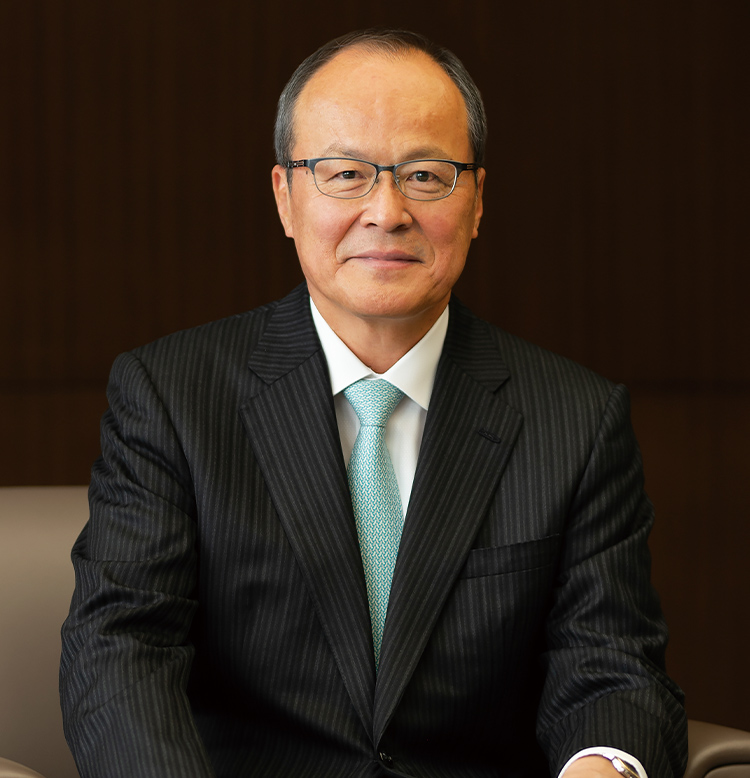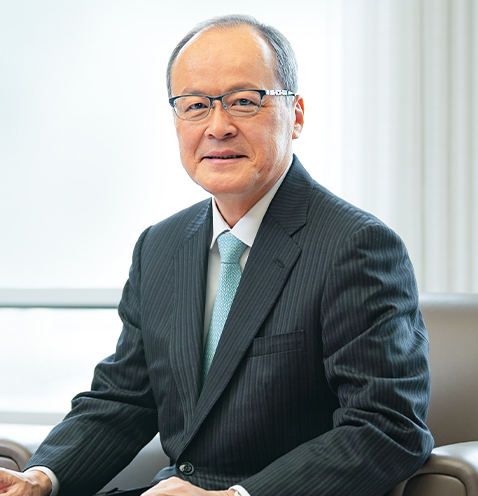In addition to increasing geopolitical risks, we are seeing accelerating global shifts toward digitalization and a low-carbon/decarbonized society. In this changing environment, MC will continue to work under its corporate philosophy, the Three Corporate Principles, to drive digital transformation (DX) and energy transformation (EX), which we see as key issues for the future, across the MC Group. We recognize DX and EX as being essential to our ability to achieve sustainable growth through the simultaneous generation of economic, societal and environmental value in ways that fulfill the needs of society.
MC will demonstrate its adaptability by effectively responding to three major shifts in its external environment—geopolitical risks, digitalization and the transition to a low-carbon/decarbonized society.
The impact of the COVID-19 pandemic since last year has further accelerated the pace of change globally, including in terms of the political and economic situation, technological advances and societal values. Among these, I would like to share our perspective regarding three shifts that will have a major impact on our business environment.
Geopolitical Risks
The most important issue from a geopolitical perspective is the hegemonic struggle between the US and China. Differences between the ideologies and value systems of these two countries have become more pronounced with the rise of state capitalist countries, including China, within the existing framework of globalism based on democracy and capitalism. Politics and economics, which were traditionally seen as separate spheres, have become increasingly intertwined, leading to concerns that an escalation of political disputes could result in economic disruption and decoupling. As a company engaged in business activities worldwide, we must thoroughly analyze geopolitical risks and exercise caution when determining where to situate our manufacturing and sales facilities.
Digitalization
Also referred to as the Fourth Industrial Revolution, advanced digitalization based on the use of AI/IoT technologies is driving the transformation of traditional business models across every industry. In order to accurately identify issues and locate profit pools in each industry, we must adopt a big picture approach to our business activities. Over many years, MC has become deeply involved in a wide variety of industries. I believe that by combining the industrial knowledge gained through that experience with our digital expertise, we can play a pioneering role in the development of DX concepts that have the potential to transform entire industries.
Transitioning to a Low-Carbon/Decarbonized Society
With Europe leading the way in global decarbonization efforts, Japan is also aiming to achieve a carbon neutral, decarbonized society by 2050. MC views this transition to a low-carbon/decarbonized society as an irreversible trend. Achieving this goal over the next three decades will require perseverance as well as numerous innovations. Since MC is involved in a variety of industries including the energy business, we have been and will continue to contribute toward realizing the necessary transformations for society.
Since becoming President and CEO, I have been consistently telling employees that the most important priority for MC is to strengthen our adaptability. The COVID-19 pandemic that began last year quickly grew to become a global crisis of historic significance, and I believe it has also highlighted some fundamental challenges that need to be addressed. The intelligence and knowledge gained by each and every one of our officers and employees through business management will enable us to demonstrate our adaptability, so that we can appropriately respond to this era of rapid transformation.
We will further accelerate our efforts to strengthen our business portfolio, promote our cyclical growth mechanism and implement HR reforms as set forth in Midterm Corporate Strategy 2021.
The MC Group's consolidated net income for the fiscal year ended March 31, 2021 was 172.6 billion yen. We are deeply concerned by this extremely disappointing result, which fell short of our earnings forecast. This result was primarily attributable to large impacts to a number of key business areas, including mineral resources, natural gas, automobiles and retail. We see this situation as a crucial moment when our business management is being put to the test. However, thanks to the rebalancing of market-related and business-related segments based on the lessons learned after we posted a consolidated loss for the fiscal year ended March 31, 2016, we have built up sufficient resilience to avoid booking a deficit for the MC Group as a whole, even when significant fluctuations occur in the commodity market.
We have been making a number of efforts under Midterm Corporate Strategy 2021—Achieving Growth Through Business Management Model. Our automobile business in Thailand, which has established deep roots in the country over many years, achieved profit growth despite the COVID-19 pandemic by carrying out sales promotion activities and introducing new models. We are also laying foundations for future growth. For example, in the fiscal year ended March 31, 2020, we acquired the European integrated energy company Eneco, which is expected to make a steady contribution to the MC Group's profits. While the economic environment is currently heading toward a gradual recovery, we believe this is no time for complacency, and we are determined to further enhance our business portfolio.
Expanding Our Portfolio in Downstream and Services Sector Businesses
MC's business portfolio is managed across 12 segments consisting of upstream, midstream, and downstream areas in four fields: Living, Mobility & Infrastructure, Energy & Power Generation, and Services (IT, Logistics, Finance, etc.).
MC has consistently performed strongly in the upstream areas and has also built up a presence across midstream industries. However, we recognized that our initiatives in downstream areas, which are closest to customers, had been inadequate. Over the past two years, we have made progress on several initiatives in downstream areas. These include the acquisition of Eneco, which has a customer base consisting of over 6 million households, primarily in the Netherlands, as well as the launch of smart-city developments in BSD City in suburban Jakarta, Indonesia, and the formation of a partnership to start evaluation of urban management. We are also enhancing our services sector business by investing in location-based services company HERE Technologies, and I believe that we have achieved our original goal of strengthening our business portfolio.
Establishing Cyclical Growth Mechanisms
To achieve sustainable growth while also adapting to changes in our business environment, we need to proceed with strategic asset replacement while also establishing cyclical growth mechanisms. We will work to establish Growth Drivers and Core Businesses by discovering New Seeds of Growth and addressing management issues in Group companies. There will also be cases in which further involvement by MC is unlikely to deliver growth.
We need to create an ecosystem based on a virtuous growth cycle, in which the task of taking such companies into their next growth phase can be handed over to suitable partners. In this context, capital gains resulting from sales, mergers or other actions will also help to maintain and improve our ROE. To establish these growth mechanisms, we need each company to become self-sufficient. From a capital perspective, we are linked to our subsidiaries as the parent company, but these companies also need to be committed to operating independently and driving their own growth as self-sufficient entities.
I would also like to ask each of our MC Group employees to think about the future of their companies, and build them into places where they can be proud to work.
Fostering Reciprocal Growth Between the Company and Its EmployeesThrough HR System Reforms
We believe that the growth of our employees is linked to the development of the MC Group. Two years ago, as part of the HR system reforms implemented under Midterm Corporate Strategy 2021, we introduced a system that allows employees to be selected for important management positions regardless of their years of service, age or gender. Since then, the number of employees in their 30s with management responsibilities has increased by approximately 1.5 times the level in April 2019. We are steadily working to establish meritocratic systems to ensure that the right people are assigned to the right positions, including by supporting women's careers. The recent changes in our business environment cannot be easily addressed by individual Business Groups alone. In most cases, finding solutions is only possible by combining our insights and coordinating on a cross-group level. We will enhance our talent management approach to ensure that assignments and compensation match ability. To achieve this, we will enable all employees to accumulate diverse experiences while being evaluated from multiple perspectives, so that management personnel can be promoted companywide across Business Group lines. We will link the growth of individual employees to the growth and success of the MC Group by consistently assigning the right people to the right positions.
We will also pursue other cross-group initiatives, such as the activities of the Industrial DX Task Force. We have made considerable efforts to engage our employees through companywide messages and in-person dialogues to promote the concepts behind Midterm Corporate Strategy 2021.

MC is pursuing its own unique DX and EX strategies that integrate DX initiatives, which are based on its knowledge and networks spanning a wide range of industries, with EX initiatives designed to combine sustainable improvement in industry competitiveness with solutions to environmental issues.
DX Initiatives
Using Industrial Knowledge to Minimize Various Forms of Waste
Our approach to DX calls for initiatives based on our unique strengths, including our network spanning a wide range of industries. MC is currently implementing over 70 DX projects with the aim of transforming entire industries by combining the industrial knowledge we have gained through practical business development across virtually every industry, from manufacturing and logistics to wholesaling and retail, with our digital know-how. A specific example of this approach is our involvement with DX initiatives in food distribution through Industry One, Inc., a joint venture company established by MC and Nippon Telegraph and Telephone Corporation (NTT) in June 2021. As part of this initiative, in 2019 we formed a business partnership with NTT in the field of industrial DX, with the aim of contributing to the transformation of Japanese industry by combining MC's industrial knowledge with NTT's advanced information and communications technology. By integrating data related to the distribution of food from manufacturers to retailers, and introducing an ordering system based on sophisticated demand forecasting through the use of AI, this project will minimize food loss, which has occurred in the past due to long-term storage, while improving inventory turnover rates and vehicle loading rates. Going forward, it will be possible to apply these concepts not only to food distribution, but to all industries.
Another example of our DX initiatives is Chubu Electric Power Miraiz Connect Co., Inc., which was established as a joint venture between MC and Chubu Electric Power to promote DX in the power retail business. Chubu Electric Power Miraiz Connect is able to provide optimized services by combining a highly localized customer base with marketing activities based on digital technologies. Chubu Electric Power's future growth and success depends directly on the prosperity of its service area. We will collaborate with them on an in-depth exploration of concepts that will help to enhance convenience for residents in their service area.
EX Initiatives
Our Dual Responsibilities of Ensuring Stable Energy Supplies While Addressing Environmental Issues
In the field of EX, MC will promote initiatives based on three perspectives: "Avoid" greenhouse gas (GHG) emissions through new development of renewable energy and other facilities and businesses; "Reduce" GHG emissions from existing facilities and projects; and "Remove" or neutralize any remaining GHG emissions. Through these initiatives, we aim to achieve sustainable improvement in competitiveness in various industries while working to find solutions to environmental issues. First, in the "Avoid" category, we aim to double our renewable power generation capacity by 2030 through the development of new offshore wind power generation and other projects. Second, in the "Reduce" category, we aim to divest our thermal power generation businesses and shift to low-carbon/zero-emission thermal power generation systems, while also switching to renewable energy sources. MC has set a goal to achieve 100% non-fossil fuel generation by 2050. During this transitional phase, we will also focus our efforts toward the creation of supply chains for next-generation energy sources in readiness for a shift to ammonia and ultimately hydrogen. Finally, in the "Remove" category, we aim to apply methods such as carbon capture and utilization/storage technology (CCU/S).
We see the realization of a low-carbon/decarbonized society as a goal that will require concerted efforts by society as a whole over the medium to long term. In the previous fiscal year, we formed an in-house Energy Committee consisting of three Group CEOs as a forum for continuing discussions about specific approaches that will allow us to address the environmental challenge of decarbonization while still ensuring stable supplies of the energy and power needed for industrial development. Each country and region has a unique perspective regarding energy security based on its specific circumstances. The most important goal of EX is to achieve a steady transition to a low-carbon/decarbonized society through comprehensive approaches that take timelines and regional characteristics into consideration. MC will actively develop new renewable energy businesses, while also continuing to fulfill its responsibilities as a long-standing member of the energy industry by ensuring stable supplies of energy and power. By approaching these efforts with a heightened sense of responsibility and commitment, and by working to realize a scenario calling for the phased reduction of CO2 emissions, we are targeting a carbon-neutral society by 2050. I am also hopeful that we can contribute to decarbonization in other Asian countries by exporting business models that have succeeded in driving emission reductions in Japan.
DX and EX initiatives can yield wide-ranging benefits. For example, a DX initiative seeking to improve the efficiency of manufacturing and logistics by monitoring retail demand will also help to reduce vehicle CO2 emissions and cut food loss, which amounts to one trillion yen per year. I believe that we can create an integrated DX/EX strategy that reflects the unique capabilities of MC by not only adapting to digitalization and the shift to a low-carbon/decarbonized society, but also by viewing these changes as a business opportunity and further developing concepts regarding the kinds of services and value that we can provide to customers.
Under the Three Corporate Principles, MC will respond to societal needs and achieve sustainable growth together with society through the simultaneous generation of triple-value growth.
The Three Corporate Principles and the Simultaneous Generation of Triple-Value Growth
Our Three Corporate Principles originated with the emergence of a new era in Japan after its turbulent transition from the Edo Period to the Meiji Restoration. Set out as values to be handed down to future generations, the Three Corporate Principles constitute the guiding philosophy for all of MC's business activities. We are working to realize the simultaneous generation of economic, societal and environmental value based on the Three Corporate Principles. Fulfilling our responsibility for the stable supply of energy and power will lead to the realization of societal value, while our contributions toward a low-carbon/decarbonized society will lead to the realization of environmental value. Furthermore, enhancing societal and environmental value will lead to the creation of economic value.
The Three Corporate Principles, the first of which is Shoki Hoko ("Corporate Responsibility to Society"), have guided MC on its path to achieve growth together with society as it endeavors to create new value in a changing world by participating in numerous industries that each present their own unique challenges. We will continue to achieve sustainable growth by responding to the needs of society.
Cross-Group Collaboration that Further Advances Our Strong Collective Capabilities
To shift toward digitalization and the realization of a low-carbon/decarbonized society, MC sees DX and EX as significant challenges in terms of encouraging changes in value systems and lifestyles. To achieve DX, we need to envision the process from the perspective of the dynamic changes that result from cross-group collaboration. Moreover, EX is obviously a concept that cannot be considered solely in terms of a single company or specific products, such as power or natural gas. Collaboration across Business Groups is therefore becoming an increasingly important factor when considering how we should change our business portfolio going forward, as well as our approach to emission reductions. We believe that all officers and employees across every Business Group need to think about these issues together, and we are working to raise awareness of these concepts accordingly.
Moving Forward
I would like to conclude this message by reiterating that despite the challenging business environment, MC will continue to do everything in its power to drive structural reforms in various industries and contribute to the realization of a low-carbon/decarbonized society. We will also work to fully meet the expectations of all of our stakeholders by achieving growth over the medium to long term under our business management model, while also addressing social and environmental issues through our business activities.





